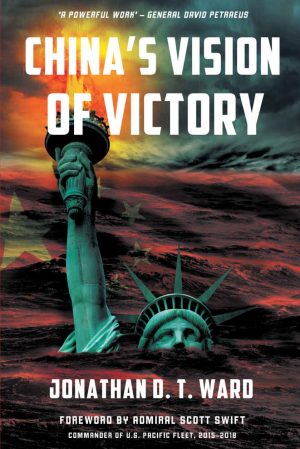From the bookshelf: ‘China’s vision of victory’
Posted By Hunter Marston on August 28, 2019 @ 12:30

The world nervously awaits a potential clampdown by Chinese security forces following weeks of clashes between police and demonstrators in Hong Kong. Global markets are reeling from the latest news of a Chinese currency devaluation in the trade war launched by US President Donald Trump. Some analysts warn of an impending cold war between Washington and Beijing.
Amid the confusing flurry of media headlines, Jonathan D.T. Ward’s China’s vision of victory [1] presents a sobering, incisive and clearly argued distillation of Chinese grand strategy and its implications for the international order. Ward offers nothing short of a lightning bolt to the American (and by extension Western, allied) policy community with a wake-up call on Chinese intentions to redraw the map with Beijing at the centre of the global order.
Ward argues that current US policy towards China, which he refers to as ‘engage but hedge’, has definitively failed to curb Beijing’s appetite for destruction and, worse, abetted China’s militaristic rise, leading us to ‘the end of an American-led order’. We are at the brink, but Ward insists there’s still time to correct course to prevent the demise of the existing order and its replacement by an authoritarian Sino-centric one.
If readers are sceptical of Ward’s grim predictions, they may be persuaded by the rigour of his analysis. Ward’s research includes years of conversations he had while living and working in China, as well as extensive analysis of Chinese Communist Party archival documents. What he found, and what he urgently portrays to readers, is not a ‘secret’ strategy. Indeed, as Ward makes clear, the Chinese have consistently laid out a vision for China’s resurgence from the founding of the CCP and Mao Zedong’s revolutionary era to the rule of Xi Jinping.
Yet the world has turned a blind eye to the implications of China’s rise, the book argues. ‘Despite new actions on trade and commerce in 2018, US understanding of China’s ascendancy remains chaotic and contradictory’, Ward writes. ‘The US lacks … the strategic focus of a rising nation like China. Thus, the Chinese Communist Party is able to work around the edges of American power, building its own global presence.’
Ward argues that the crux of China’s ‘comprehensive national power’ rests on its economic might. Economic growth (coupled with military expansion) fuels China’s global quest to establish itself in a dominant position without peer competitors. That requires replacing the United States at the top of the pecking order. In so doing, China has played a long game and engaged in a multi-fronted competition, using businesspeople, students and entrepreneurs from a range of industries and sectors to steal intellectual property, learn from top international universities and institutions, and use that expertise to enrich and empower the CCP.
China’s path to dominance requires building influence from the developing world to industrialised Europe via Xi’s global Belt and Road Initiative. It also envisions eroding the US system of alliances throughout Europe and Asia. The Chinese vision seeks to rewrite the rules of international security, ending the system of alliances and ‘zero-sum game, absolute security’, replacing it with an order built on a hierarchy with China at the top. As Ward explains, historically ‘the Chinese world order was not an order made of states of equal power. It was an order that derived from Chinese supremacy.’
The focus of this book is on US–China rivalry, but Ward makes clear that American allies play a pivotal role in upholding the liberal world order that has prevailed since the end of World War II. Without support from democratic partners, this contest might be ‘a close-run thing’. But with renewed efforts to maintain alliances and economic leadership, Ward asserts, ‘the United States is in a far stronger position overall than China’.
Ward’s recommendations may be a step too far for some allies, such as Australia, which relies heavily on China for trade and economic wellbeing. For instance, following from his assertion that China’s military power rests on its economic power, Ward insists on ‘closing China off from access to the things that pave its way to power’. It’s not clear whether he is advocating a full-scale decoupling from the Chinese economy, but following the logic of his arguments leads one to that conclusion. Whether that’s a realistic proposition is debatable.
The majority of Australian strategic thinkers may prefer not to be forced to choose between the United States and China. Whether readers and policymakers are ultimately persuaded by the arguments of China’s vision of victory, Ward’s book is a timely call to focus the debate on the enormously consequential strategic choices to come as China’s actions continue to define the 21st century.
Article printed from The Strategist: https://www.aspistrategist.org.au
URL to article: https://www.aspistrategist.org.au/from-the-bookshelf-chinas-vision-of-victory/
URLs in this post:
[1] China’s vision of victory: https://www.amazon.com/Chinas-Vision-Victory-Jonathan-Ward/dp/0578438100
Click here to print.